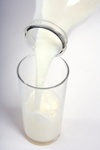 What impact do dairy and alcohol have on the development of Alzheimer’s disease? In this part of Dr. Juan’s ongoing series on this increasingly common illness, he addresses the evidence.
What impact do dairy and alcohol have on the development of Alzheimer’s disease? In this part of Dr. Juan’s ongoing series on this increasingly common illness, he addresses the evidence.
Dairy products may be linked to the development of Alzheimer’s — by altering vascular factors, such as weight reduction. Calcium intake from dairy products has been associated with an anti-obesity effect. Plus, vitamin D from dairy affects insulin sensitivity and, indirectly, blood sugar levels. The phosphorus and magnesium in dairy products may affect blood pressure control. Magnesium has
antioxidant and anti-inflammatory functions.
These potentially beneficial properties of dairy products prompted researchers to study the effects of dairy on the development of Alzheimer’s. Australian researchers performed a meta-analysis of eight studies and found that lower consumption of milk or dairy was linked to a poorer cognitive function — and an increased risk for vascular dementia. But, eating high-fat dairy was linked to greater cognitive decline. So low-fat is the way to go.
Still, due to the study sizes and methods, we can’t draw any firm conclusion on the role of dairy products in cognitive function. Future studies are needed.
Alcohol has many properties that reduce the cardiovascular risks in vascular dementia. Flavanoids in wine may prevent the oxidative damage in the brain leading to Alzheimer’s. Alcohol increases HDL (the good cholesterol), and reduces platelet aggregation and the risk of stroke. It also has anti-inflammatory effects and reduces insulin resistance — linked with hypertension, metabolic syndrome and diabetes.
In a meta-analysis of 23 large population studies, researchers concluded that low to moderate consumption of alcohol was associated with a 38% reduced risk of dementia, including Alzheimer’s disease. (This did not hold true for vascular dementia.) As well, the evidence between alcohol consumption and cognitive function was strongest for wine.
These preliminary results showing a beneficial effect of moderate intake of alcohol on cognitive decline are interesting. Still, we have no firm conclusion, because those individuals who drank a moderate amount of alcohol may be living a healthier lifestyle, in terms of diet, exercise and antioxidant consumption.
However, I don’t consider it a good idea to up alcohol intake in the pursuit of good health.
Read my previous article in this series:
How You Can Prevent Alzheimer’s Disease
More Natural Ways to Prevent Alzheimer’s Disease
